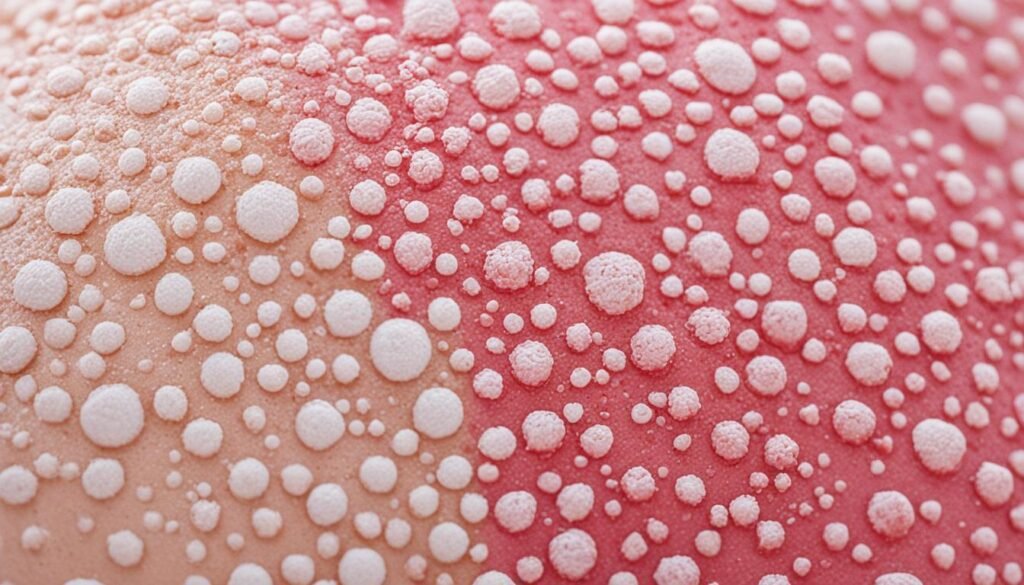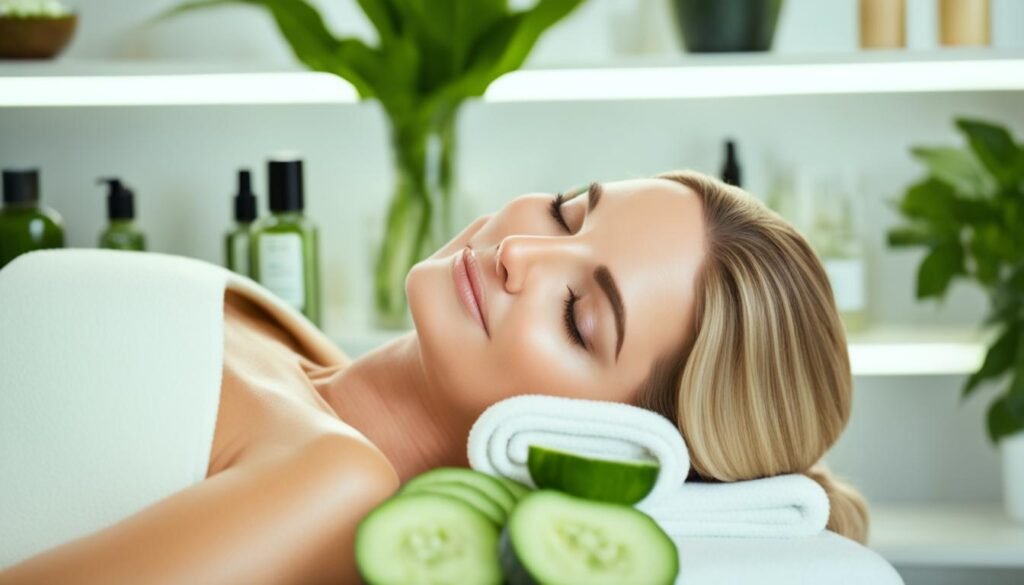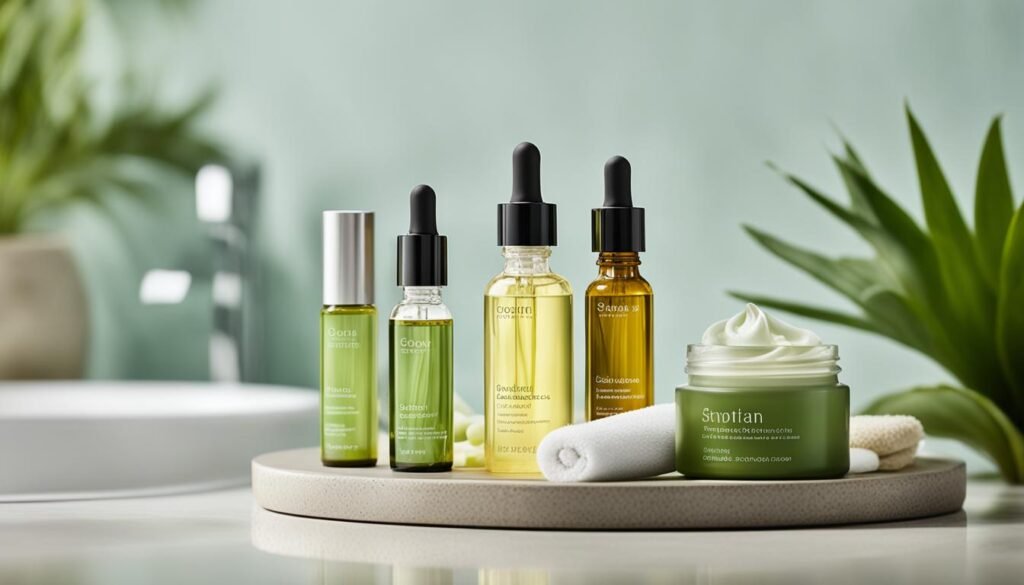Did you know that stress can have a profound impact on your skin? From redness and breakouts to premature aging, chronic stress can wreak havoc on your complexion. But don’t worry, there are effective antiaging skincare solutions specifically designed to target stressed skin and restore its radiance. In this article, I will explore expert tips and recommended products that can help you combat the effects of stress on your skin and achieve a youthful, glowing complexion.
Key Takeaways:
- Stress can cause redness, breakouts, and premature aging.
- Simplify your skincare routine and eliminate irritating products.
- Use a retinol product to normalize stressed skin.
- Hydrate with an emollient moisturizer and gentle cleanser.
- Address breakouts with a clarifying cleanser and benzoyl peroxide products.
Dealing with Redness
Stressed skin often presents with redness, especially for individuals with rosacea. To effectively address this concern, it is crucial to establish a targeted skincare routine that focuses on reducing redness and inflammation. By incorporating suitable products and making a few adjustments, you can help normalize your skin and restore its natural balance.
Simplify Your Skincare Routine
One of the key steps in managing redness is simplifying your skincare routine. Eliminate any potentially irritating products that may exacerbate redness and inflammation. Stick to gentle and non-irritating cleansers, moisturizers, and treatments specifically formulated for sensitive or rosacea-prone skin.
Incorporate Retinol
Retinol is a powerful ingredient known for its ability to improve multiple skin concerns, including redness. It helps normalize your skin’s cell turnover, reducing redness and promoting a more even complexion. Choose a retinol product suitable for your skin type and gradually incorporate it into your nighttime skincare routine.
Hydrate with an Emollient Moisturizer
For individuals with redness-prone skin, it is essential to restore the skin’s barrier function and provide ample hydration. An emollient moisturizer, such as CeraVe’s healing formula, can help soothe and nourish the skin while strengthening its protective barrier. Use it both morning and night to maintain optimal hydration levels and minimize redness.
Consider Hydrocortisone Cream with Caution
In cases of extreme irritation and redness, a dermatologist may recommend a hydrocortisone cream for temporary relief. However, it is crucial to use this medication cautiously and seek professional guidance. Prolonged or improper use of hydrocortisone creams can lead to side effects and potential skin damage. Only use them as directed by a medical professional.
Opt for a Hydrating Face Wash
When dealing with redness, it’s best to choose a gentle and hydrating face wash that cleanses without stripping the skin’s natural moisture. CeraVe’s cleanser, formulated with hydrating ingredients like ceramides, can effectively cleanse the skin while keeping it hydrated and calm.
Other Treatment Options
In addition to the core skincare routine, incorporating additional treatment options can further help reduce redness. Soothing serums containing beneficial ingredients like niacinamide, masks that provide instant relief, and products with antioxidant-rich formulas can all contribute to a more balanced complexion and reduced redness.
By following these steps and utilizing the right products, you can effectively address redness and restore your skin’s natural radiance. Remember to consult with a skincare professional for personalized recommendations that specifically cater to your unique skin concerns.
Managing Breakouts

Acne and oily skin are common symptoms of stress. Dealing with breakouts can be frustrating, but with the right approach, you can effectively address and manage them. Here are some key strategies:
1. Clarifying Cleanser
Using a clarifying cleanser twice a day can help control breakouts and minimize excess oil production. Look for a cleanser specifically formulated for acne-prone or oily skin. These cleansers often contain ingredients like salicylic acid or benzoyl peroxide, which can help unclog pores and reduce inflammation.
2. Avoid Over-Exfoliation
While exfoliation is essential for removing dead skin cells and keeping pores unclogged, over-exfoliating can actually worsen breakouts. Too much exfoliation can strip the skin of its natural oils, leading to increased oil production and potential irritation. Stick to exfoliating no more than two to three times a week, and choose gentle exfoliants that won’t cause further damage to the skin.
3. Benzoyl Peroxide Products
Benzoyl peroxide is a powerhouse ingredient known for its effectiveness in treating acne. It helps kill acne-causing bacteria, reduces inflammation, and clears clogged pores. Incorporating benzoyl peroxide products, like PanOxyl, into your skincare routine can help calm irritated or stressed-out skin and prevent future breakouts.
When dealing with breakouts, it’s important to note that consistency is key. Stick to a regular skincare routine and give your skin time to adjust to new products. If breakouts persist or worsen, consider consulting a dermatologist for personalized recommendations and treatment options.
Understanding the Effects of Stress on the Skin
Intense or chronic stress can have a profound impact on the skin, leading to various undesirable effects such as premature aging, inflammation, and increased acne. When we experience stress, our bodies release cortisol, a hormone that can disrupt the normal functioning of our skin and contribute to several skin conditions.
One of the primary ways stress affects the skin is by accelerating the aging process. Elevated levels of cortisol can break down collagen and elastin, proteins responsible for maintaining the skin’s structure and elasticity. As a result, the skin may become dull, and fine lines and wrinkles may appear prematurely.
In addition to aging, stress can also trigger or worsen existing skin conditions. Conditions like eczema, psoriasis, and rosacea are known to be aggravated by stress-induced inflammation. Inflammation can cause redness, itching, and discomfort, further exacerbating the symptoms of these skin conditions.
Furthermore, stress can also contribute to the development of acne. Elevated cortisol levels can stimulate the oil glands in the skin, leading to increased oil production. This excess oil, along with the buildup of dead skin cells, can clog pores and create an environment conducive to acne-causing bacteria.
It is crucial to understand the detrimental effects of stress on the skin to effectively address and prevent these concerns. By adopting a holistic approach that incorporates stress management techniques, skincare products, and lifestyle changes, we can mitigate the impact of stress and promote healthier, more resilient skin.
The Effects of Stress on the Skin:
| Effects | Description |
|---|---|
| Premature Aging | Stress can accelerate the aging process, leading to dullness, fine lines, and wrinkles. |
| Inflammation | Stress-induced inflammation can worsen existing skin conditions like eczema, psoriasis, and rosacea. |
| Acne | Elevated cortisol levels can stimulate oil production, contributing to the development of acne. |
It is evident that stress takes a toll on our skin, making it essential to prioritize stress management and establish a skincare routine that specifically targets stress-induced concerns. By doing so, we can maintain a healthy and radiant complexion, despite the challenges of stress.
Importance of a Proper Skincare Routine

Having a proper skincare routine is crucial, especially during times of high stress. It not only helps maintain the health and appearance of your skin but also provides a much-needed self-care routine that can alleviate stress and promote relaxation. Anti-stress skincare focuses on nourishing the skin barrier and calming inflammation, addressing the specific needs of stressed-out skin.
When it comes to an effective skincare routine, consistency is key. By following a regular routine, you provide your skin with the necessary tools to combat the effects of stress and maintain a healthy complexion. Let’s explore some essential steps to incorporate into your anti-stress skincare routine:
- Cleansing: Start your skincare routine by cleansing your face to remove dirt, oil, and impurities. Look for a gentle cleanser specifically formulated to nourish and soothe stressed skin. Avoid harsh cleansers that can strip away the skin’s natural moisture barrier.
- Hydrating: Hydration is crucial for stressed skin. Look for moisturizers and serums that contain hydrating ingredients like hyaluronic acid, ceramides, and natural oils. These ingredients help replenish moisture, restore the skin barrier, and improve its ability to retain hydration.
- Protection: As stress can lead to increased inflammation and oxidative stress, it is important to protect your skin from further damage. Incorporate a broad-spectrum sunscreen with SPF to shield your skin from harmful UV rays. Opting for a sunscreen with added antioxidants can provide additional protection against free radicals.
- Treatment: To specifically target the effects of stress on the skin, incorporate treatment products that contain ingredients known for their calming and repairing properties. Look for products with antioxidants, such as vitamin C and green tea extract, that help combat inflammation and neutralize free radicals.
- Eye Care: The delicate skin around the eyes is often the first to show signs of stress and fatigue. Use a hydrating eye cream or serum to minimize dark circles, puffiness, and fine lines. Look for products that contain peptides and growth factors to nourish and rejuvenate the eye area.
- Relaxation Rituals: Taking care of your skin is not just about the products you use. Incorporating relaxation rituals into your skincare routine can further enhance its anti-stress benefits. Consider incorporating techniques like facial massage, meditation, or applying a soothing face mask to promote relaxation and reduce tension.
Remember, everyone’s skin is unique, so it is important to choose products that work best for your specific needs. Consult with a dermatologist or skincare professional to develop a personalized skincare routine that addresses your skin concerns and promotes a healthy, radiant complexion.
Expert Tips for Managing Stress-Induced Aging
Stress-induced aging can have visible effects on the skin, including the appearance of fine lines, wrinkles, redness, dullness, and uneven texture. It’s essential to address these signs and combat stress-induced aging to maintain a youthful and radiant complexion. Here are some expert tips to help manage and reduce the signs of stress-induced aging:
- Soothing Serums: Incorporate soothing serums into your skincare routine to calm and nourish stressed skin. Look for serums containing ingredients like niacinamide, known for its calming properties and ability to improve the skin’s texture and tone.
- Hydration: Keep your skin hydrated to plump and smooth the appearance of fine lines and wrinkles. Look for products that contain hydrating ingredients like hyaluronic acid, which can attract and retain moisture, helping to improve the skin’s overall appearance and elasticity.
- Adaptogens: Consider incorporating adaptogens into your skincare routine. Adaptogens are natural substances that help the body adapt to stress and promote overall well-being. Look for skincare products containing adaptogenic herbs like ashwagandha and rhodiola, which can help reduce the impact of stress on the skin.
Expert Quote:
“Incorporating soothing serums, hydrating ingredients, and adaptogens into your skincare routine can help manage the signs of stress-induced aging and promote a healthy complexion.” – Dr. Emily Johnson, Dermatologist
By following these expert tips, you can effectively manage the signs of stress-induced aging and maintain a youthful and healthy complexion. Remember to prioritize self-care, embrace skincare routines that focus on nourishment and hydration, and seek out products specifically designed to combat the effects of stress on the skin.
Specific Product Recommendations

When it comes to addressing stressed skin, choosing the right products is essential. Here are some highly recommended anti-stress skincare products that can help restore and rejuvenate your skin:
Serums
- Naturium Niacinamide Serum: This powerful serum contains niacinamide, a key ingredient known for its ability to reduce inflammation and strengthen the skin barrier.
Cleansers
- CeraVe Hydrating Cleanser: This gentle cleanser effectively removes dirt and impurities without stripping the skin of its natural oils, leaving it hydrated and refreshed.
Creams
- Glow Recipe Avocado Melt Retinol Eye Sleeping Mask: This firming cream is specifically designed for the delicate eye area. It combines retinol and avocado to moisturize and reduce the appearance of fine lines and wrinkles.
Facial Oils
- Avène XeraCalm A.D Lipid-Replenishing Oil: This facial oil is enriched with nourishing oils and ceramides to replenish the skin’s moisture barrier and soothe dryness and irritation.
Moisturizers
- Skinceuticals Triple Lipid Restore 2:4:2: This moisturizer is formulated with a unique lipid ratio to restore the skin’s natural barrier function, improve elasticity, and promote a smooth and youthful complexion.
Remember, everyone’s skin is unique, so it’s important to find the products that work best for you. Consult with a skincare professional to determine the most suitable products for your specific needs.
These are just a few of the many anti-stress skincare products available on the market. Be sure to read product labels, check customer reviews, and consider your skin type and concerns when making a decision. Investing in high-quality skincare products can make a significant difference in the health and appearance of your stressed skin.
Additional Tips for Managing Stress

While taking care of your skin is important, it is equally crucial to prioritize self-care and stress management. Incorporating healthy habits into your lifestyle can greatly reduce the negative effects of stress on your body and skin. Here are some additional tips:
1. Get Adequate Sleep
A good night’s sleep plays a vital role in managing stress and maintaining overall well-being. Aim for 7-9 hours of quality sleep each night to help your body and mind recover. Establish a relaxing bedtime routine and create a comfortable sleep environment.
2. Support Gut Health
Research suggests a strong connection between gut health and mental well-being. Prioritize a balanced diet rich in fiber from fruits, vegetables, and whole grains to support a healthy gut. Incorporate probiotic-rich foods like yogurt or sauerkraut into your diet or consider taking a probiotic supplement to promote a healthy gut microbiome.
3. Consider Supplements
Supplements can play a complementary role in managing stress. Ashwagandha, ginseng, and rhodiola are adaptogenic herbs that may help your body adapt to stress more effectively. Consult with a healthcare professional before adding supplements to your routine to ensure they are suitable for you.
4. Practice Mindfulness
Mindfulness involves focusing your attention on the present moment without judgment. Engaging in mindful practices such as meditation, deep breathing exercises, or yoga can help reduce stress levels. Take a few minutes each day to pause, reflect, and find moments of calm.
“Mindfulness is the key to unlocking the full potential of your mental and emotional well-being.” – [insert expert’s name]
By incorporating these additional tips into your routine, you can effectively manage stress and promote both physical and mental well-being. Remember that taking care of yourself is a holistic process that goes beyond skincare alone.
Now, let’s explore some specific product recommendations tailored to stressed skin in the next section.
Importance of Emotional Well-being

While skincare is important, it is equally crucial to address and manage emotional well-being. Chronic stress can have a significant impact on skin conditions, and finding healthy ways to cope with stress is essential. Techniques like deep breathing, meditation, exercise, and therapy can help in managing stress and its effects on both the mind and the skin.
Embracing Acceptance-Based Strategies
One effective approach to stress management is the use of acceptance-based strategies. These strategies focus on accepting and acknowledging our emotions, rather than trying to suppress or resist them. By practicing acceptance, we can better navigate stress and its impact on our well-being.
Embracing acceptance-based strategies allows us to cultivate self-compassion and develop resilience in the face of stress. Rather than judging or criticizing ourselves for feeling stressed, we can learn to validate our emotions and respond to them with kindness and understanding.
The Power of Mindfulness
Mindfulness is another powerful tool for managing stress and promoting emotional well-being. It involves bringing our attention to the present moment, without judgment or attachment. By practicing mindfulness, we can develop greater self-awareness and learn to respond to stress in a calm and centered manner.
One simple mindfulness exercise is deep breathing. Taking slow, deep breaths can activate the body’s relaxation response, reducing stress and promoting emotional balance. This practice can be done at any time, whether at home, work, or even during a skincare routine.
Exercise for Stress Relief
Physical exercise is not only beneficial for our physical health but also plays a vital role in managing stress. When we exercise, our body releases endorphins, which are natural mood-boosting chemicals that help reduce stress and anxiety.
Whether it’s going for a walk, jogging, practicing yoga, or engaging in a favorite sport, finding a form of exercise that we enjoy can significantly contribute to our overall emotional well-being.
Seeking Support through Therapy
When stress becomes overwhelming or begins to impact our daily life, seeking support from a mental health professional can be immensely helpful. Therapy provides a safe and non-judgmental space to explore our thoughts, feelings, and behaviors, helping us develop healthier coping mechanisms and strategies to manage stress.
A therapist can offer guidance, support, and evidence-based techniques tailored to our individual needs, empowering us to navigate stress more skillfully and promote emotional well-being.
Creating a Balanced Lifestyle
In addition to skincare and stress management techniques, creating a balanced lifestyle is crucial for overall emotional well-being. This includes nourishing our bodies with healthy foods, prioritizing quality sleep, and engaging in activities that bring joy and relaxation.
By making conscious choices to take care of our physical and emotional well-being, we can promote a sense of balance and resilience in the face of stress.
Top Skincare Ingredients for Stressed Skin

When it comes to caring for stressed skin, choosing the right skincare products can make a world of difference. By incorporating specific ingredients that provide stress relief and support the skin’s resilience, you can effectively nourish and protect your skin. Here are some top skincare ingredients to look for:
- Adaptogens: Adaptogens like ashwagandha and reishi have gained popularity for their stress-relieving properties. These botanical extracts help the skin adapt to stressors and promote a healthier, more balanced complexion.
- Antioxidants: Antioxidants are essential for combating free radicals and oxidative stress, which can accelerate skin aging. Look for ingredients like vitamin C, green tea extract, and resveratrol to help protect the skin from environmental damage.
- Peptides: Peptides are small chains of amino acids that help stimulate collagen production and improve skin elasticity. They can help reduce the appearance of fine lines and wrinkles, promoting a more youthful complexion.
- Ceramides: Ceramides are naturally occurring lipids that play a crucial role in maintaining the skin’s barrier function. By replenishing ceramide levels, you can improve hydration, strengthen the skin barrier, and prevent moisture loss.
- Growth Factors: Growth factors are proteins that regulate cell growth and repair. They help support the skin’s natural rejuvenation process, promoting a smoother, more youthful appearance.
These skincare ingredients work synergistically to hydrate, soothe, repair, protect, and maintain the overall health of stressed skin. By incorporating products that contain these powerful ingredients into your skincare routine, you can effectively address the effects of stress on your skin and achieve a radiant, healthy complexion.
Taking a Holistic Approach

To truly address stressed skin, I believe it is essential to take a holistic approach. This means incorporating skincare, stress management techniques, and making necessary lifestyle changes. By embracing a balanced and mindful lifestyle, individuals can better manage stress and positively impact the health and appearance of their skin.
When it comes to skincare, it’s vital to choose products that nourish and support the skin’s overall well-being. Look for ingredients that promote hydration, repair, and protection, such as antioxidants, peptides, and ceramides. Additionally, consider incorporating adaptogens like ashwagandha and reishi into your routine, as they can provide stress relief and support the skin’s resilience.
Stress management techniques play a significant role in maintaining healthy skin. Find activities that help you relax and unwind, such as meditation, deep-breathing exercises, or engaging in hobbies you enjoy. Taking time for self-care is essential in reducing stress levels and improving your overall well-being.
Simple Lifestyle Changes
Alongside skincare and stress management, making lifestyle changes can have a transformative impact on stressed skin. Here are a few recommendations:
- Get sufficient sleep: Lack of sleep can contribute to heightened stress levels and affect the skin’s appearance. Aim for 7-9 hours of quality sleep each night.
- Follow a balanced diet: Eating a nutritious diet rich in fruits, vegetables, whole grains, and lean proteins can help support overall skin health.
- Stay hydrated: Drinking an adequate amount of water each day can help keep the skin hydrated and promote a healthy complexion.
- Exercise regularly: Physical activity not only reduces stress but also improves blood circulation, which can support healthy skin.
Remember, taking a holistic approach requires commitment and consistency. Implementing these changes and incorporating them into your daily routine will help you manage stress levels and enhance the health and appearance of your skin.
By prioritizing both internal and external care, you can achieve a harmonious balance that promotes overall well-being and beautiful, glowing skin.
| Lifestyle Changes | Benefits |
|---|---|
| Get sufficient sleep | Reduces stress levels and improves skin’s appearance |
| Follow a balanced diet | Supports overall skin health and provides essential nutrients |
| Stay hydrated | Keeps the skin hydrated and promotes a healthy complexion |
| Exercise regularly | Reduces stress, improves blood circulation, and supports healthy skin |
Conclusion
In conclusion, taking care of stressed skin is of utmost importance. By incorporating expert tips, targeted skincare products, stress management techniques, and self-care practices, individuals can effectively combat the signs of aging, inflammation, and breakouts caused by stress. It is crucial to find a personalized skincare routine that addresses individual needs and to prioritize emotional well-being.
With the right approach, it is possible to achieve a radiant and youthful complexion, even in the face of stress. Remember to choose skincare products with beneficial ingredients such as adaptogens, antioxidants, peptides, and ceramides. Additionally, making lifestyle changes and practicing stress-reduction techniques can help improve overall skin health.
By embracing a holistic approach that combines skincare, stress management, and self-care, individuals can nourish and rejuvenate their stressed skin. Prioritizing both the physical and emotional aspects of well-being will lead to healthier, more balanced skin and a more positive overall sense of self.
FAQ
How can I address redness in stressed skin?
To address redness, simplify your skincare routine, eliminate irritating products, and incorporate a retinol product to normalize the skin. A moisturizer with emollient properties, such as CeraVe’s healing formula, can help restore the skin’s barrier. In extreme cases of irritation, a hydrocortisone cream may be used, although it is advisable to consult a professional. Using a hydrating face wash, like CeraVe’s cleanser, can also be beneficial. Other products with soothing serums, masks, and niacinamide can help reduce redness.
What can I do to manage breakouts on stressed skin?
To manage breakouts, use a clarifying cleanser twice a day and avoid over-exfoliation, as it can lead to increased oil production. Products containing benzoyl peroxide, such as PanOxyl, can help calm irritated or stressed-out skin.
How does stress affect the skin?
Intense or chronic stress can cause premature aging, inflammation, and increased acne. Stress releases cortisol, a hormone that can lead to skin issues such as dullness, fine lines, and wrinkles. Stress can also worsen existing skin conditions like eczema, psoriasis, and rosacea.
Why is a proper skincare routine important for stressed skin?
A proper skincare routine is crucial for stressed skin as it focuses on nourishing the skin barrier and calming inflammation. Anti-stress skincare products often contain oils, ceramides, antioxidants, growth factors, and peptides to hydrate, repair, protect, and maintain collagen synthesis in stressed-out skin.
What are some expert tips for managing stress-induced aging?
To combat stress-induced aging, soothing serums with niacinamide, superfoods, and adaptogens can be beneficial. Hydration is key, and products containing hyaluronic acid and moisturizing ingredients can help plump the skin and improve its overall appearance.
Can you recommend any specific products for stressed skin?
Some recommended products for stressed skin include serums, cleansers, creams, facial oils, and moisturizers. Brands like Naturium, CeraVe, Glow Recipe, Avène, and Skinceuticals offer products with ingredients like niacinamide, superfoods, adaptogens, and probiotics to nourish and calm the skin.
What additional tips can help in managing stress?
Getting enough sleep, supporting gut health with probiotics and fiber-rich foods, and taking supplements like ashwagandha, ginseng, and rhodiola can help reduce the negative effects of stress on the body and skin. Practicing mindfulness and acceptance-based strategies can also be beneficial.
How important is emotional well-being in managing stressed skin?
Emotional well-being is crucial in managing stress and its impact on the skin. Chronic stress can worsen skin conditions, and finding healthy ways to cope with stress is essential. Techniques like deep breathing, meditation, exercise, and therapy can help manage stress and improve both mental and physical health.
What are some top skincare ingredients for stressed skin?
Skincare ingredients that provide stress relief and support the skin’s resilience include adaptogens like ashwagandha and reishi, antioxidants, peptides, ceramides, and growth factors. These ingredients work together to hydrate, soothe, repair, protect, and maintain the skin’s overall health.
How can a holistic approach benefit stressed skin?
Taking a holistic approach that incorporates skincare, stress management techniques, and lifestyle changes can effectively address stressed skin. By embracing a balanced and mindful lifestyle, individuals can better manage stress and positively impact their skin’s health and appearance.




